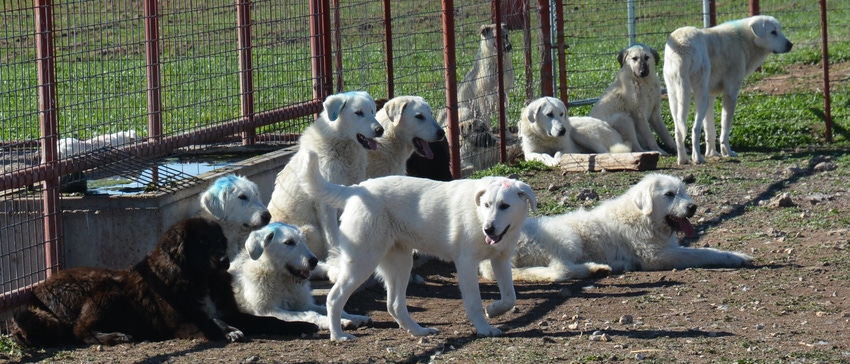Much remains unknown about livestock guardian dogs and how to best utilize their talents to prevent predation.
March 8, 2019

Texas A&M AgriLife Research in San Angelo, Texas, has added Bill Costanzo as a livestock guardian dog (LGD) research specialist, in partnership with the Texas Sheep & Goat Predator Management Board, to help the sheep and goat industries better prevent predation.
The San Angelo-based LGD program provides educational outreach and conducts research on livestock guardian dogs as flock and herd protectors and predator deterrents, the announcement from AgriLife Research said.
The Texas Sheep & Goat Predator Management Board funded Costanzo’s newly created position. A member-approved fee of 90 cents is taken from each sheep or goat sold at auction, and the Sheep & Goat Predator Management Board then uses that money in a variety of ways to prevent predation on small ruminants, AgriLife Research center director Dr. John Walker explained.
“We had had a couple of LGD field days, and we had a project where we put several livestock guardian dogs with board members, and they liked what they saw,” Walker said. “The funding by the Texas Sheep & Goat Predator Management Board allowed us to expand our LGD program so we could do -- and learn -- more.”
The overall mission of the LGD program is to increase the number of people who are using LGDs, which, in turn, increases the number of lambs and goats ultimately making it to auction or adulthood, thereby increasing industry revenue, the announcement said.
“We are delighted to have hired Bill Costanzo for our Livestock Guardian Dog program,” said Dr. Reid Redden, Texas A&M AgriLife Extension Service sheep and goat specialist in San Angelo. “It is critically important to the sheep and goat industry that we have someone whose sole responsibility is to help the industry better utilize livestock guardian dogs to prevent sheep and goat predation in Texas.
Costanzo has utilized LGDs for the past eight years with his own flock in northern California. Dogs are utilized extensively in California to protect sheep flocks and goat herds, in part due to environmental regulations and laws against trapping in many areas, AgriLife Research said.
“You really can’t raise sheep or goats in California successfully without livestock guardian dogs,” Costanzo said. “I think there’s a lot of potential in the sheep industry at this point. I want to encourage people to use livestock guardian dogs, because they have worked so well and were so successful for me. I’m excited to be a part of the LGD team and my new community.”
One of the main things Costanzo is tasked with in his new role is finding answers for many of the yet-unanswered questions related to using LDGs in Texas. Only commonly used in the U.S. since the 1970s, there is still a great deal unknown about the dogs and how to best utilize their talents.
“With the LGD program, we want to increase awareness of livestock guardian dogs and how to properly use them — and, hopefully, increase the use of them,” Walker said. “There are still a lot of questions: How do you best use them? What are the best management practices? How often do they get off the property? Where do they go?”
Many of those questions have led to studies currently underway in the LGD program that Costanzo will expand upon.
“There’s a lot of technology available now that wasn’t before. For example, we’re developing automatic feeders where [a radio-frequency identification] chip on the dog’s collar triggers the feeding and keeps other animals like raccoons out of the feed,” Walker said.
“We’re also looking at cheap [global positioning system] trackers where you can get real-time data on where a dog is at on your mobile phone,” he added. “We want to test out available equipment and then be able to recommend to people who want to use it what we think the best options are.”
Source: Texas AgriLife Research, which is solely responsible for the information provided and is wholly owned by the source. Informa Business Media and all its subsidiaries are not responsible for any of the content contained in this information asset.
You May Also Like


.png?width=300&auto=webp&quality=80&disable=upscale)
